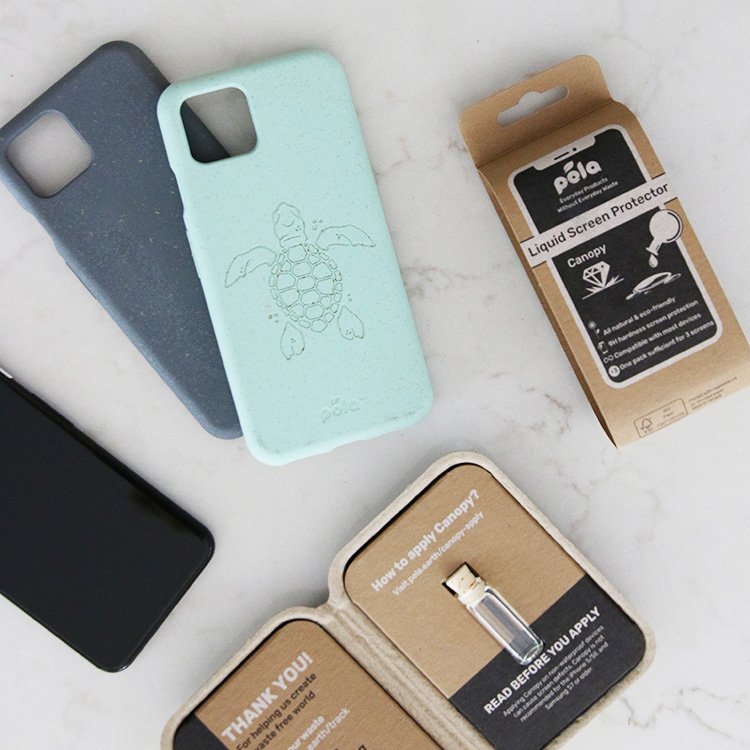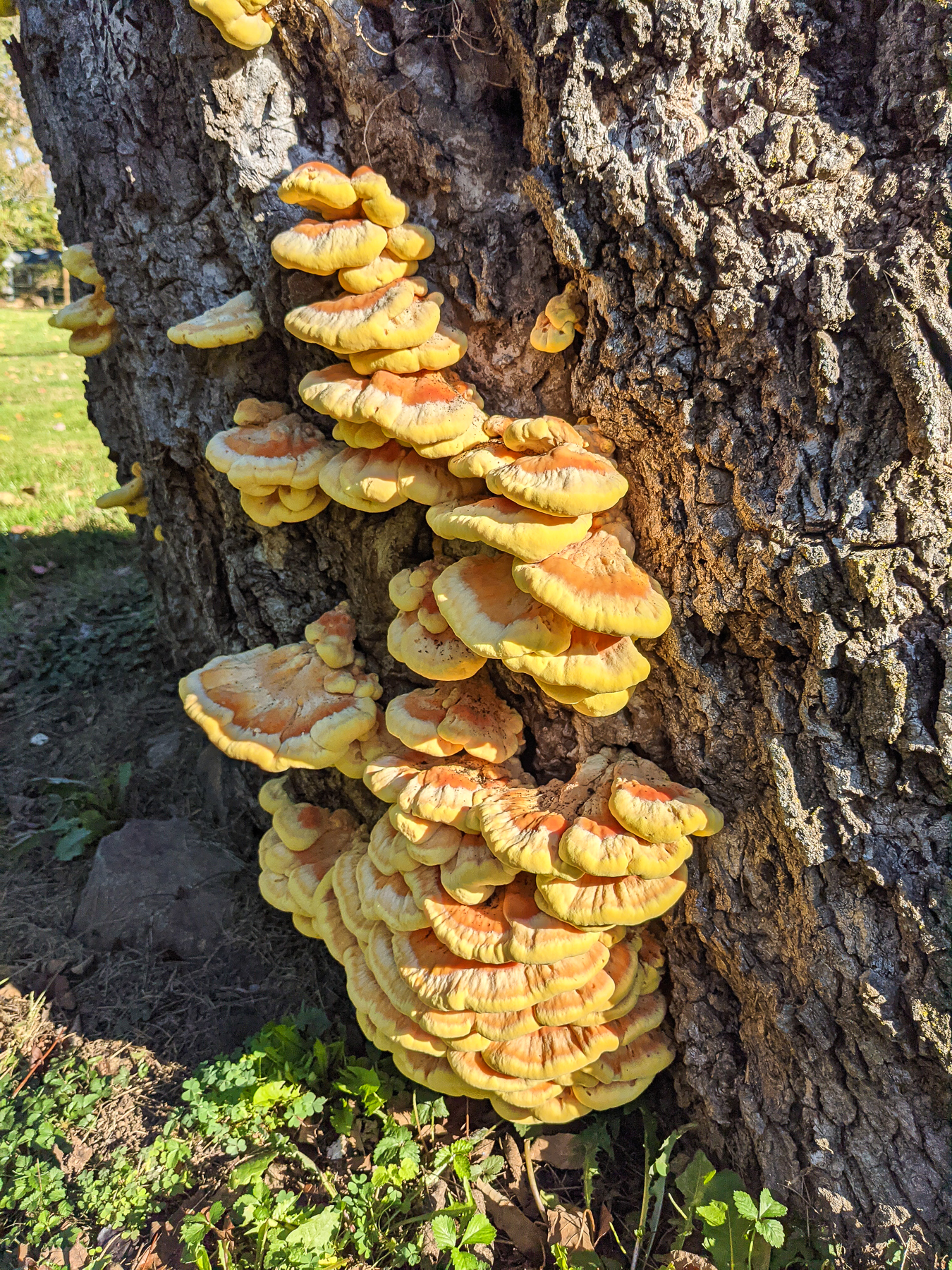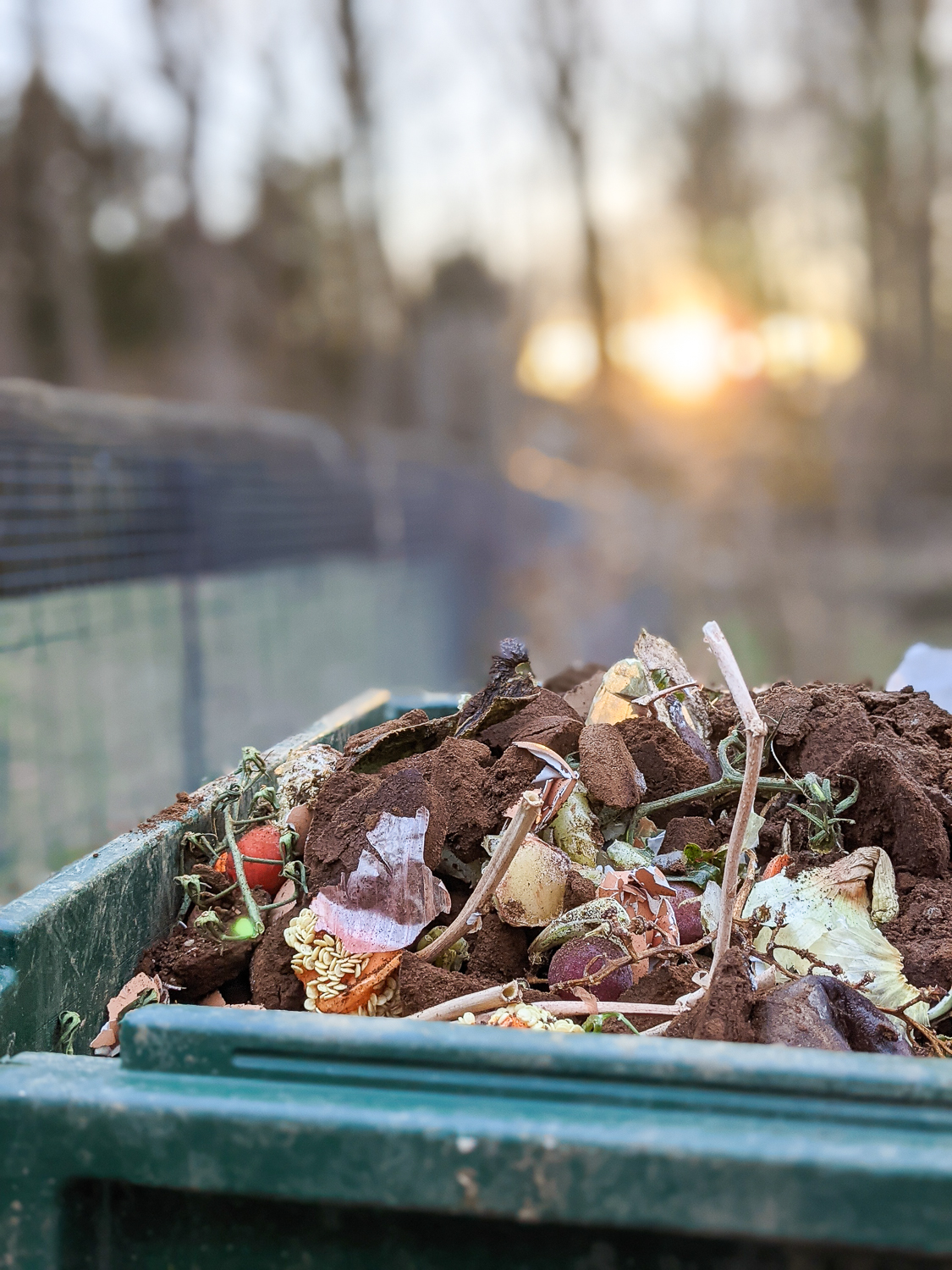Can You Compost Citrus?
Can you compost citrus? Do lemons peels go in the compost pile? Are orange peels good for compost? Read on for the answers and the caveats about whether you can put citrus peels in compost piles, how to compost citrus food scraps, and the benefits of orange peels in compost.

Whether you’re an experienced composter or a newbie to the black gold magic, you may have wondered whether orange peels are good for compost. As oranges are a type of citrus, there are some myths and misconceptions surrounding the use of citrus peels in composting.
Let me tell you straight up – citrus peels, including orange peels, are good for a healthy compost pile.
Can you compost citrus?
Yep! You can put citrus peels in compost bins. You can compost orange peels, lemon peels, lime peels, grapefruit peels, and even the whole citrus fruits themselves.
As an aside, you might consider making one of these DIY vinegar cleansers with those citrus peels before tossing them in the compost pile. The rosemary and grapefruit peel vinegar cleanser was the star of the show, and you can compost the infusion ingredients after you make the cleanser. It’s a low-waste win-win-win.
Some people believe that citrus peel food scraps can kill off friendly worms and bugs, while others think that composting citrus peels is too much of a hassle because citrus peels take a long time to break down. However, the truth is that orange peels and other citrus food scraps are safe and beneficial to add to your compost heap.
In fact, we have an entire interactive chart showing which items you can compost and which materials do not belong in a compost bin. If you’re looking for more guidance on what to compost beyond citrus, check out our Can I Compost…? Guide.
Before we get too tart about lemons and oranges in the compost buckets, let’s dive into this consideration and discuss it in more detail.
What are orange peels made of?
Orange peels (and other citrus peels) are the thick, spongy outer layer of citrus fruits. Citrus fruits include food like oranges, lemons, limes, and grapefruits. They are made up of several components, including:
- Water: Orange peels contain a high percentage of water, which makes them an excellent source of moisture for your compost pile.
- Fiber: Orange peels are rich in fiber, which helps to add bulk to your compost and improve soil structure.
- Nutrients: Orange peels contain a variety of nutrients that are beneficial for your plants, including nitrogen, potassium, and phosphorus. They also contain calcium, magnesium, and sulfur.
- Essential oils: Orange peels contain citrus oils that can help to deter pests and insects from your compost pile.
When you add orange peels and other types of food scraps to your compost pile, they will break down over time and release these components into the soil. This will help to improve the overall health and fertility of your soil, which will in turn benefit your plants when you apply the compost amendment to your soil.
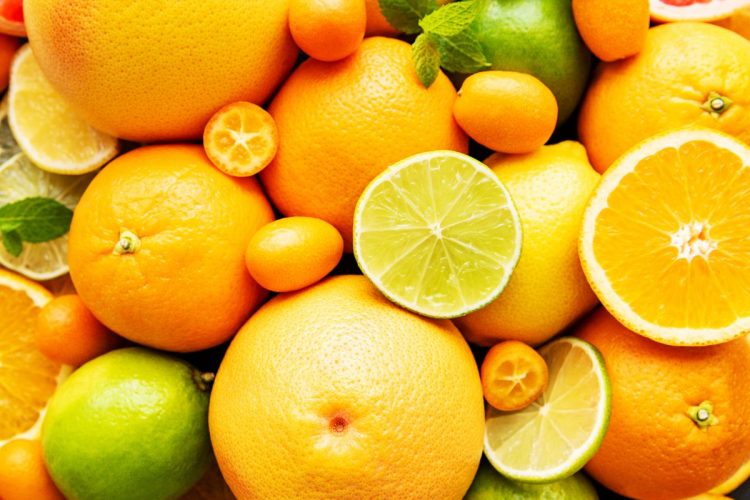
Benefits of adding orange peels to compost mix
Orange peels (and other types of citrus scraps) are a great addition to your compost pile, as they offer several benefits that can help improve the quality of your compost. Here are some of the benefits of using citrus peels in compost:
- Rich in nutrients: Orange peels contain high amounts of nitrogen, potassium, and phosphorus, which are essential nutrients for plants. Adding orange peels to your compost pile can help enrich the soil and promote healthy plant growth.
- Speeds up composting: Orange peels can help speed up the composting process (when you don’t have enough green/nitrogen materials) by providing a source of energy for the microorganisms that break down the organic matter in the compost pile.
- Improves soil structure: The organic matter in orange peels can help improve soil structure by increasing water retention and promoting the growth of beneficial microorganisms.
- Deters pests: The strong smell of citrus fruits and orange peels can help deter pests, such as rodents, from your compost pile.
When adding orange peels to your compost pile, it’s important to balance them out with other organic matter, such as leaves, grass clippings, and vegetable scraps. This will help maintain the proper carbon-to-nitrogen ratio and prevent the compost pile from becoming too acidic.
Overall, using orange peels in compost can be a great way to improve the health of your garden and reduce waste. So the next time you enjoy a juicy orange, don’t throw away the peels – add them to your compost pile instead!
Related Reading: 7 Ways to Repurpose Orange Peels
How to compost orange peels
Composting orange peels is a great way to reduce waste and create nutrient-rich soil for your garden. If you’re composting through a composting pick-up service or another commercial composting process, just toss your citrus peels in your collection bucket. No extra work is required.
If you compost via a compost drop-off service or a community compost program like ShareWaste, be sure to check the instructions for compost drop-off. Most places will have no problem taking citrus peels whether they are whole or cut into smaller pieces, but it’s a good practice to check their guidelines to help them maintain an efficient and healthy compost system.
If you’re managing your own outdoor compost pile or composting tumbler, here are some tips on how to compost orange peels that can help them break down more quickly and help you maintain a more balanced composting pile:
- Cut the peels into small pieces: Orange peels take longer to decompose than other compost materials, so cutting them into smaller pieces can help speed up the process. However, this is not necessary. If you’re not concerned about fast decomposition, toss your citrus peel scraps into the bin as is. They will break down eventually. (I’m a lazy composter. You better believe I toss citrus scraps into my compost bins with abandon and never cut them up before composting them.)
- Layer the peels: Layer the orange peels with other compost materials such as leaves, grass clippings, and vegetable scraps. This will help balance the carbon-to-nitrogen ratio in your compost pile. If you don’t have materials to layer when you empty your orange peels and other scraps into the bin, just be sure to come back later and mix the contents of the compost heap to keep the pile balanced.
- Keep the pile moist: Organic materials in a compost heap need moisture to decompose properly. Make sure to keep your compost pile moist but not too wet. This will create ideal conditions to ensure your compost pile breaks down and doesn’t get slimy or stinky. P.S. Compost browns are a great way to dry out the pile if gets a little too moist and yucky. And you probably have easy access to more compost brown material than you might think.
- Turn the pile: Turning your compost pile regularly will help aerate it and speed up the decomposition process. It will also help ensure your compost heap doesn’t start to smell or attract animals.
Remember to add orange peels to your compost pile in moderation. Too many citrus peels can make the compost pile too acidic, which can slow down the decomposition process.
Related Reading: How To Store Food Scraps For Composting At Home
Things to keep in mind while composting orange peels
Composting orange peels can be a great way to reduce your waste and create nutrient-rich soil for your plants. However, there are a few things to keep in mind while composting orange peels:
- Balance: Orange peels are high in acidity, so it’s important to balance them out with other compost materials that are more alkaline. This will help maintain a neutral pH level in your compost pile.
- Size: Orange peels take longer to decompose than other compost materials, so it’s important to cut them into smaller pieces to speed up the process if you want to get finished compost quickly. Smaller pieces increase the surface area on which microbes and good bacteria can break down the organic waste. You can use a food processor or a sharp knife to chop them up into smaller bits if desired.
- Layering: When adding orange peels to your compost pile, layering them between other compost materials can help balance the acidity, moisture, and airflow in the compost heap. This will help prevent the food waste from clumping together and slowing down the decomposition process.
- Moisture: Orange peels are high in moisture, so it’s important to balance them out with dry compost brown materials like leaves or straw. This will help maintain the proper moisture level in your composting pile.

Citrus decomposition in nature
Somewhere during the discussion of the dos and don’ts of composting, the idea spread that citrus doesn’t belong in a compost bin. The reasons for this supposition vary. Some say citrus peels take too long to compost or simply never break down. Others suggest citrus makes the compost too acidic which harms the worms and other beneficial organisms in the compost. I’m sure there are myriad other reasons for this belief.
But what happens when an orange falls from a tree to the ground and is left alone? Do you think it rots and eventually decomposes? You better believe it!
In essence (no citrus pun intended), an orange falls from a tree and eventually decomposes in the soil underneath the tree. This is effectively composting.
If the tree is lucky, the seeds inside the orange might even sprout a new citrus tree in the neighborhood. It’s all part of the natural circle of life and nature’s fool-proof nutrient recycling system.
So let’s debunk this “citrus is bad for compost piles” myth.
Citrus can definitely go into a compost pile.
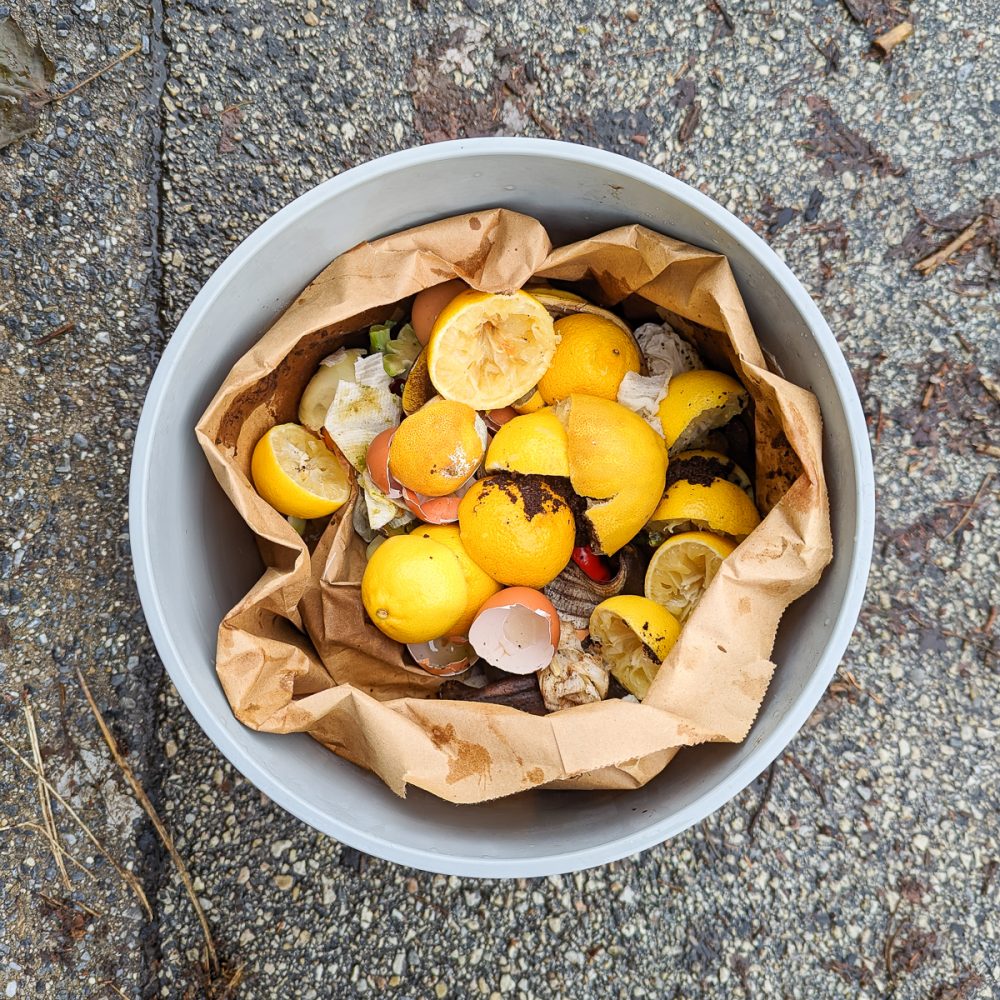
Frequently Asked Questions about Composting Citrus
Why can you compost citrus?
Simply put, you can compost citrus because it is organic matter that is part of nature’s nutrient recycling system – decomposition and the circle of life. Anything that has ever lived can be composted.
Composting is simply the process of breaking down dead or rotting organic material, natural compounds, organisms, chemicals, and matter into smaller and simpler elements so they can be reused to create and feed new life. Why would oranges, lemons, limes, grapefruits, and other citrus food scrap items not be included in this natural process??!
Nature has phenomenal recycling skills. But for human intervention, everything lives, dies, and becomes new life again. Humans, however, have unfortunately done a great job of extracting more from nature than we put back in while also using advanced science to turn matter (like oil) into complex compounds (like plastic) that take centuries or longer to break down. And we are doing this work at breakneck speed.
Unlike plastic, however, an orange peel or a leftover lemon will break down in a matter of weeks or months when added to a well-managed compost pile. It’s just another type of organic matter with a rightful place in the circle of life-giving nutrients that pass from one organism to the next in nature.
Can you compost moldy citrus fruit and peels?
You sure can! Moldy food scraps and organic waste will be just fine in a compost heap. Toss them into the compost pile and the activity of the microorganisms will break down the organic waste along with all the other organic materials in the composting pile.
What issues does citrus cause in outdoor compost bins?
Primarily, orange peels and other citrus food scraps are accused of being too acidic for compost bins and taking too long to break down. While citrus is acidic and does take longer to decompose, that doesn’t necessarily make it a problem for compost bins when properly managed.
How long does it take an orange peel to decompose?
The amount of time it takes for citrus peels to break down in a compost pile depends largely on how the pile is managed. It can take anywhere from a few weeks to well over a year.
In industrial or commercial composting settings, where piles are managed more actively and at higher temperatures, citrus scraps like orange peels and lemon rinds will break down in a matter of weeks along with everything else in the pile.
In a lazily-managed backyard compost bin (like mine) that doesn’t get too hot and isn’t turned all that often, the scented scraps could linger for many months or a year. As you use the finished compost over time, you may need to sift out citrus scraps and leave them in compost piles longer than other types of produce scraps.
Additionally, you can speed up the decomposition process of citrus in compost bins by cutting up the citrus scraps into small pieces. Citrus and other kitchen scraps will also break down more quickly if you keep the compost pile hot, damp, and well-aerated to provide a great environment for the critters and microbes to get to work.
Indeed, citrus scraps take longer to break down than many other food scraps (especially other produce items). But just because something breaks down more slowly than other items in the bin doesn’t mean the citrus scraps should head to landfills (where they will languish even longer).
Thus, even though citrus isn’t the fastest organic matter to break down in a compost pile, that doesn’t mean it doesn’t belong in the bin. Recycling the nutrients from citrus to return to the soil is much better than sending citrus food waste to a landfill, even if the process is a little slower.
Is citrus too acidic to compost?
Citrus is acidic, and the acidity of citrus can change the acidity of the compost mix if you have an excessive amount of citrus in the mix. Much like everything else in nature and life, compost piles are most effective when well-balanced, and that includes a balanced pH (or level of acidity).
If you compost at home and include a variety of food scraps from everyday life in your compost mix, you won’t have any issues with periodic additions of citrus in compost bins. We’ve been adding all types of citrus and citrus peels to our compost bins for years without any issues. The aroma of a bit of citrus in the pile might even help deter curious critters and wildlife from exploring your compost pile.
Excessive amounts of citrus may make the compost mix more acidic than you’d like. This can slow down the decomposition process and create less-than-ideal conditions for some of the microorganisms to perform their work.
However, you won’t likely have any issues with an overabundance of citrus in your pile unless you add loads and loads of citrus to your compost. An orange juice maker might have way too much citrus, but a regular family or household adding a variety of food scraps to a typical compost pile won’t have trouble with too much citrus as part of their everyday composting.
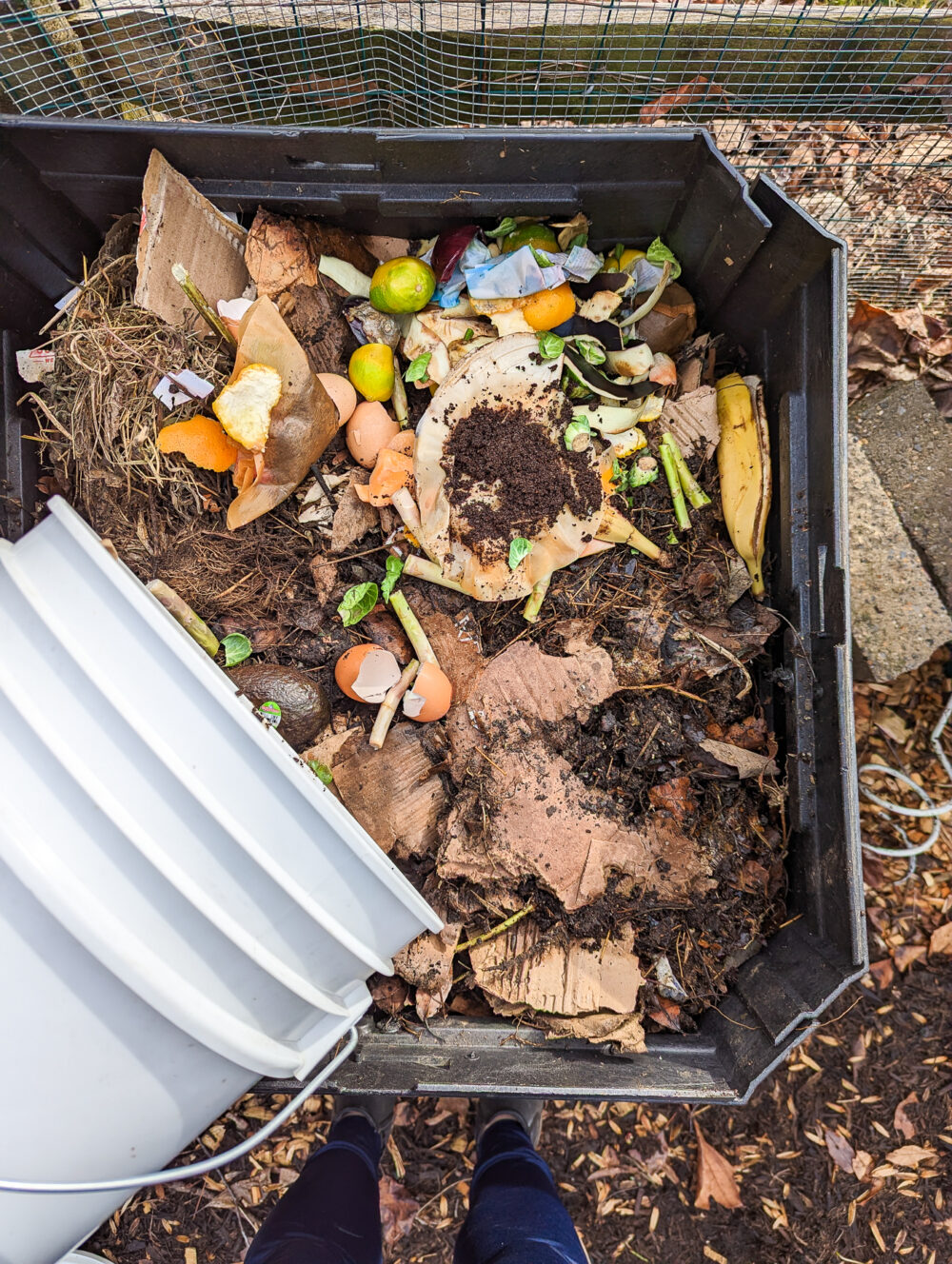
How can I balance the acidity of orange peels in a compost mix?
Some types of organic matter in a compost bin have a higher pH (are less acidic or more alkaline) and others have a lower pH (are more acidic). Items with high pH levels (i.e. more alkaline) can help offset the higher acidity of citrus peels in a compost bin. Alternatively, items with higher acidity exacerbate the pH balance.
To offset acidity in a compost pile (whether it comes from citrus peels or other items in your bin), you can try the following steps in your composting process:
- Add alkaline materials: Add materials with a high pH such as wood ash, lime, or crushed eggshells. These materials will help to neutralize the acidic content of the compost pile.
- Add less acidic materials: Avoid adding too many acidic materials to the compost pile. This includes items like citrus peels, coffee grounds, and pine needles. Instead, add more neutral or alkaline materials such as wood ash, straw, or wood chips.
- Turn the pile: Turning the compost pile regularly will help to mix the materials and distribute the alkaline materials more evenly throughout the pile.
- Monitor the pH level: Use a pH meter to monitor the pH level of the compost pile. Ideally, the pH level should be between 6.0 and 8.0. If the pH level is too low, add more alkaline materials. If it’s too high, add more acidic materials like those included in the list below.
Here are some common compostable materials sorted by those that are more acidic and those that are more alkaline. If you’re adding lots of citrus peels to your compost bin, consider also adding more alkaline organic materials with lower pH to help balance the acidity of the pile.
| Common Compostable Acidic Materials | Common Compostable Alkaline/Neutral Materials |
| Coffee grounds | Wood ash or wood chips |
| Tea leaves | Lime |
| Strawberries | Eggshells |
| Banana peels | Straw |
| Tomatoes | Oyster shells |
| Grass clippings | Paper (ripped up or shredded)* |
| Pine needles | Cardboard (ripped up or shredded)* |
| Blueberries | Dry leaves* |
*Technically, these items are neutral compost brown materials (items high in carbon that help balance a compost mix full of food scraps, yard waste, and other organic matter). They are not alkaline, but they do help reduce the acidity of the compost heap, and carbon is an important element of a well-balanced compost mix. Read more about different types of compost browns and how you can collect most of them for free.
Do you need to test the pH level of your compost pile if you add citrus and other acidic materials?
If you’re making finished compost professionally or have a precise use for it in your garden, it might be worth testing the acidity level. But if you’re a casual home composter just looking to reduce food waste, you don’t need to test the acidity of your compost pile. I’ve been composting for years and don’t even own any tools to test the acidity of the compost mix.
The truth is that you’ll be able to smell if the pile is too acidic. Healthy compost has a sweet, Earthy smell that’s actually quite pleasant. If the pile smells sour (and will probably look pretty damp or even wet), you probably need to add some compost brown materials and/or some alkaline organic matter. Add those materials, give it a mix, and come back to check it in a couple of days. You’ll probably find that it’s back to normal again.
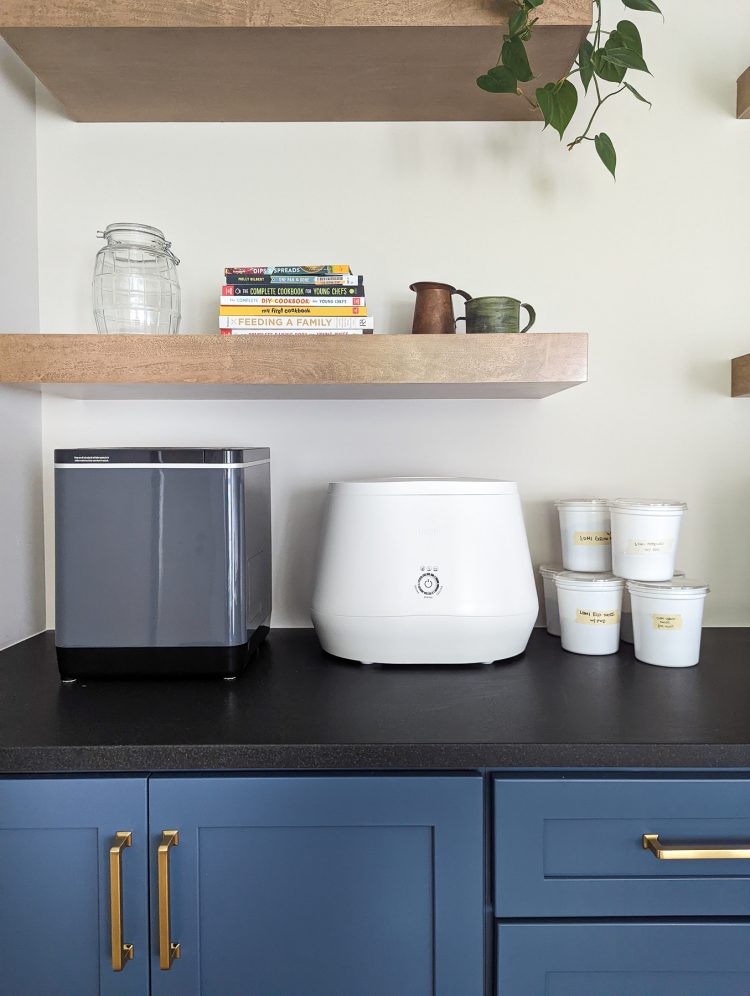
Can you compost citrus peels in an electric composter?
Citrus peels can be added to an electric composter but you’ll want to be sure to cut the peels up into small pieces and not add too many orange peels or citrus parts to the composter bucket. The fibrous texture of the peels can jam up the grinder in the electric composter bucket if there are too many of them.
On a side note, we have a whole series about electric composters. In general, I’m not really a fan. Before investing hundreds of dollars in fancy technology, check out all our posts on electric composters to see if they are actually right for your composting circumstances.
Vermicomposting | Acidic Scraps in Composting Worm Bins
Worms (especially the species used for vermicomposting) don’t love citrus because they don’t thrive in an especially acidic environment. I mean, would you? The myths around excluding citrus from compost bins probably stem from vermicomposting, a type of composting by which special (seemingly very hungry) worms chow through food scraps to create compost at a pretty quick rate.
Too much acidity in a vermicomposting environment could kill the special worms adept at living, working, and reproducing in the conditions of a vermicomposting system. So it’s advisable to be a bit more cognizant of acidity levels in a vermicompost environment because the worms are particularly sensitive to such conditions.
To protect against potential issues, some vermicomposting gurus simply discourage the introduction of citrus to the environment. I suppose this is a solution, so long as we don’t conflate citrus management in a worm bin with citrus exclusion in composting overall.
Nonetheless, it’s okay to include some citrus scraps in a worm bin so long as you’re careful. If you have another way to compost, you might be better off feeding your worms other scraps and saving your citrus scraps for the other pile. And if you don’t have another option to compost citrus, use the citrus scraps for home products like DIY cleaning solutions, holiday decorations, or one of these seven ways to repurpose orange peels.
Related Reading: 5 Easy DIY Scented Vinegar Cleanser Recipes
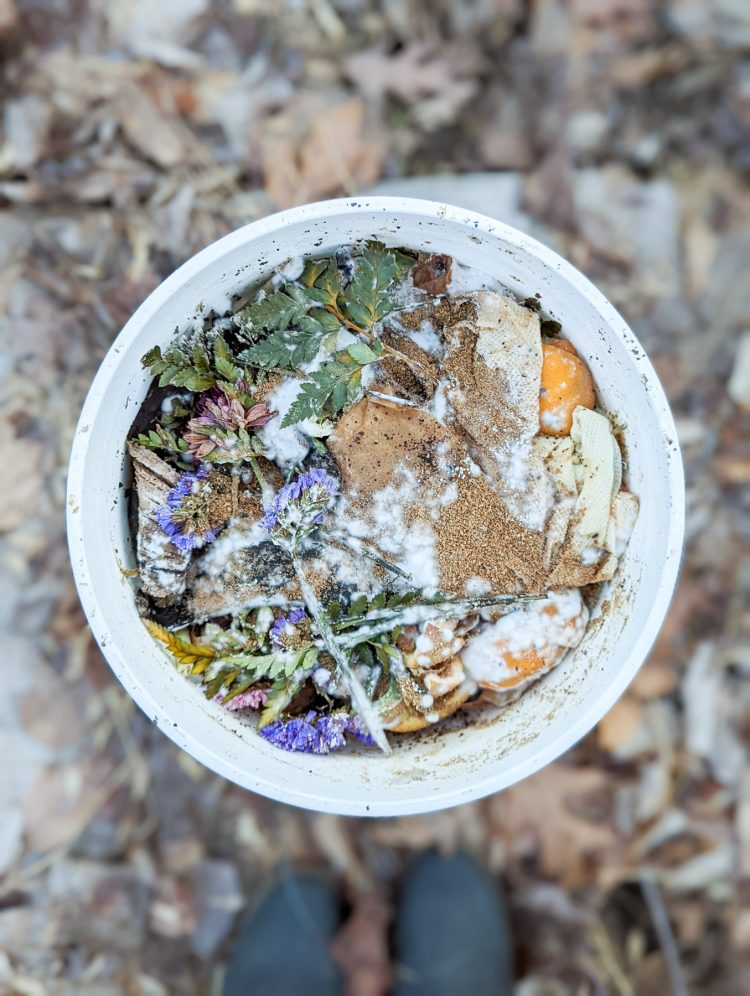
Bokashi Composting to Mitigate Acidity of Composting Citrus
Bokashi is a Japanese word meaning “fermented organic matter” and relates to composting using special bran in an environment with limited oxygen to allow anaerobic bacteria to break down organic matter. Bokashi is not a complete composting method that results in a finished compost suitable for soil amendment, but it does reduce the acidity of citrus scraps.
Allowing citrus to ferment in a Bokashi compost system before adding it to a compost pile will limit the impact of the citrus acidity on the overall pH of the pile. It could help manage the unintended impacts of excess amounts of citrus if it’s becoming a problem in a compost pile. As a bonus, Bokashi fermentation before adding organic matter to a traditional compost pile adds useful bacteria and microorganisms that speed up the decomposition process.
Don’t Waste Citrus Scraps in Landfills
So there you have it. The myth of citrus being bad for compost bins is debunked. You will need to manage the pH of your compost pile no matter what you put in it. Loads of citrus could amp up the acidity and deter beneficial bacteria from making a home in the pile. But citrus can definitely be composted when managed properly.
Do you compost citrus in compost piles?
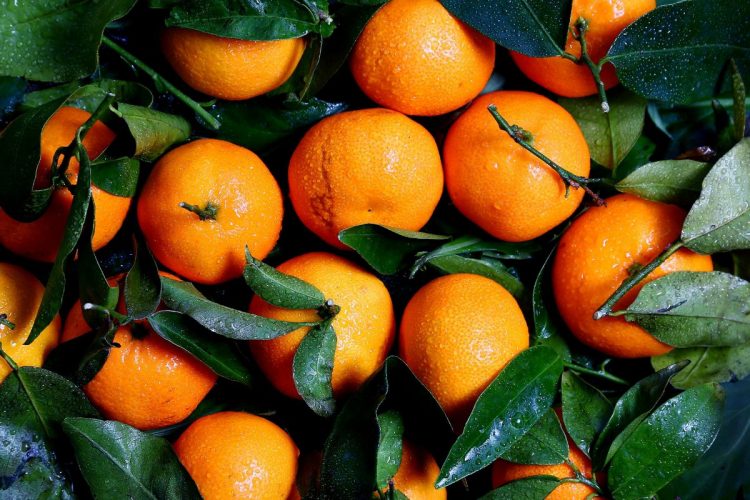
If You Like Citrus in Compost Bins, You Might Also Like
Can I Compost…? Interactive Tool
9 Non-Food Household Items You Can Compost That Might Surprise You
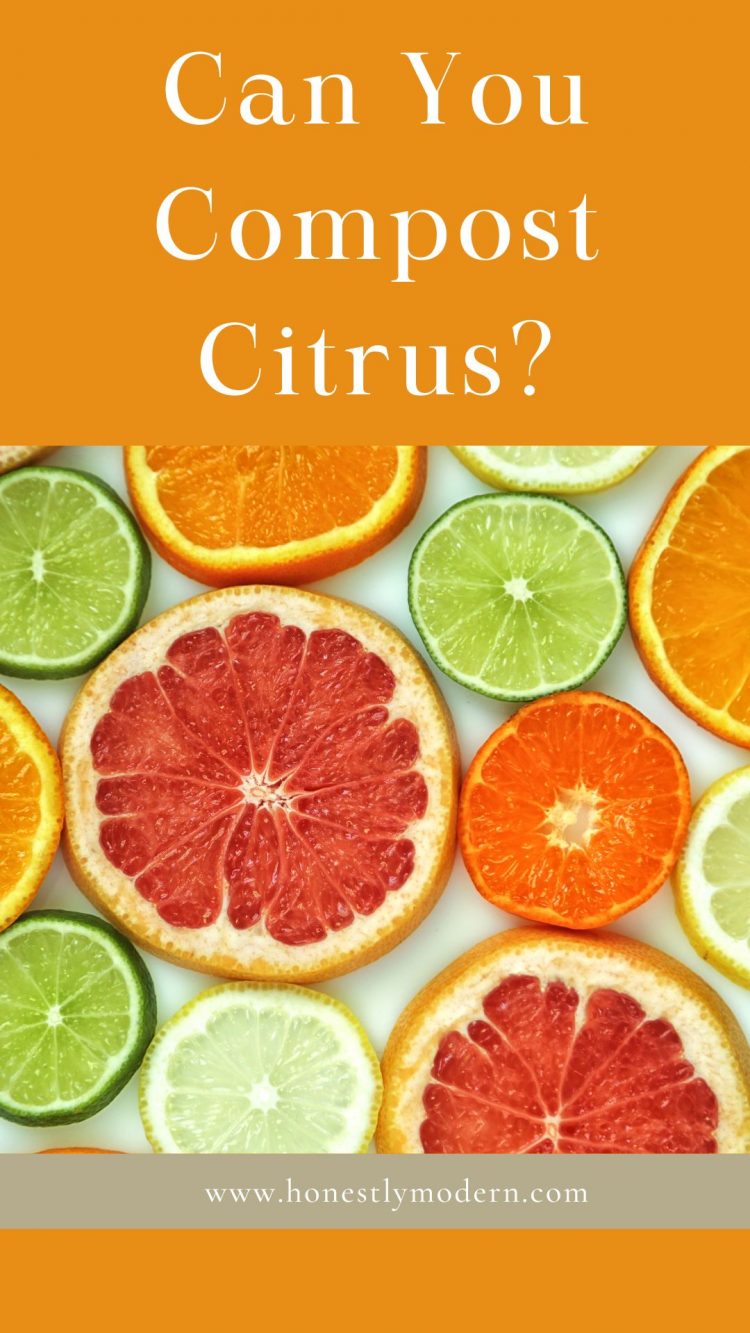

Jen Panaro
Jen Panaro, founder and editor-in-chief of Honestly Modern, is a self-proclaimed composting nerd and advocate for sustainable living for modern families. To find her latest work, subscribe to her newsletter, Stepping Stones.
In her spare time, she’s a serial library book borrower, a messy gardener, and a mom of two boys who spends a lot of time in hockey rinks and on baseball fields.
You can find more of her work at Raising Global Kidizens, an online space to help parents and caregivers raise the next generation of responsible global citizens.

